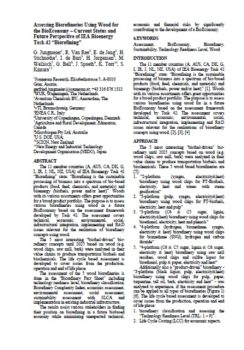Assessing Biorefineries Using Wood for the BioEconomy – Current Status and Future Perspective of IEA Bioenergy Task 42 “Biorefining”
 Assessing Biorefineries Using Wood for the BioEconomy – Current Status and Future Perspective of IEA Bioenergy Task 42 “Biorefining”
Assessing Biorefineries Using Wood for the BioEconomy – Current Status and Future Perspective of IEA Bioenergy Task 42 “Biorefining”
The 11 member countries (A, AUS, CA, DK, G, I, IR, J, NL, NZ, USA) of IEA Bioenergy Task 42 “Biorefining” state: “Biorefining is the sustainable processing of biomass into a spectrum of bio-based products (food, feed, chemicals, and materials) and bioenergy (biofuels, power and/or heat)”. Woods with its various assortments offers great opportunities for a broad product portfolio. The purpose is to assess various biorefineries using wood in a future BioEconomy based on the assessment framework developed by Task 42. The assessment covers technical, economic, environmental, social, infrastructural integration, implementing and R&D issues relevant for the realization of biorefinery concepts using wood.
The 5 most interesting “biofuel-driven” bio-refinery concepts until 2025 based on wood (e.g. wood chips, saw mill, bark) were analyzed in their value chains to produce transportation biofuels and biochemicals. The life cycle based assessment is developed to cover issues from the production, operation and end of life phase.
The assessment of the 5 wood biorefineries is done in the “Biorefinery Fact Sheet” including technology readiness level, biorefinery classification, Biorefinery Complexity Index, economic assessment, environmental assessment, social assessment, sustainability assessment with SLCA and implementation in existing industrial infrastructure.
The results assist various stakeholders in finding their position on biorefining in a future biobased economy while minimizing unexpected technical, economic and financial risks by significantly contributing to the development of a BioEconomy.
Jungmeier – 2015 – Assessing Biorefineries Using Wood for the BioEconomy


